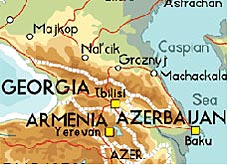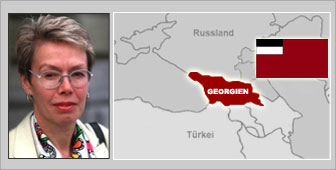Swiss lend support to southern Caucasus

Switzerland is working to bring stability to the countries of the southern Caucasus region that are facing major political, economic and social problems.
The government hopes to improve conditions for the people of Georgia, Armenia and Azerbaijan through development projects and economic initiatives.
The economic reconstruction of the region is being highlighted at a conference in Bern on Tuesday, which is examining Swiss cooperation in eastern Europe and the Commonwealth of Independent States.
The role of government, financial reform and the concept of “good governance” are some of the themes being discussed.
In her opening remarks, foreign minister Micheline Calmy-Rey said the cabinet was willing to give technical and financial assistance to the three countries undergoing transition.
She said this cooperation would improve the countries’ economic prospects and indirectly contribute to conflict resolution.
For close to a decade the Swiss Agency for Development and Cooperation (SDC) and the State Secretariat for Economic Affairs (seco) have collaborated on initiatives in former Eastern bloc countries.
The SDC gives SFr11 million ($8 million) a year to aid transition in the region, while seco contributes SFr7 million ($5 million).
The Swiss run a number of regional projects to foster entrepreneurship, support civil society institutions and help set up farming cooperatives.
Corruption
Switzerland is also supporting local non-governmental organisations in their fight against the rampant corruption that plagues the region.
Transparency International, an anti-corruption watchdog, rates Georgia and Azerbaijan as two of the most corrupt nations in the world, and the situation in Armenia is not considered much better.
Many politicians are viewed as dishonest, working for their own interests rather than those of the people.
Considered a crossroads between Europe and Asia, the southern Caucasus region – which lies between the Black Sea and the Caspian Sea – is a place where numerous cultures, religions and languages converge.
Although culturally rich, the collapse of the Soviet system, ethnic conflicts and war have left the region’s 15 million population largely impoverished.
As a result, about ten per cent of the population or 1.5 million people are considered internally displaced persons.
Powerful neighbours
Despite gaining independence in 1991, Georgia, Armenia and Azerbaijan are generally forced to toe the line laid down by their more powerful neighbours.
They are flanked by Russia, Turkey, Iran and Iraq – all of which have a considerable interest in the region’s oil and natural gas reserves.
Although Azerbaijan attracts some foreign investment because of its own oil and natural gas resources, industry in the southern Caucasus region has come to a virtual standstill since the collapse of the former Soviet Union.
Various ethnic conflicts have also contributed to the dire economic situation.
Armenia and Azerbaijan are officially still at war with each other and their borders remain closed.
Ethnic conflicts
Their conflict surrounds a dispute over the predominantly Armenian populated enclave of Nagorno-Karabakh, which was given to Azerbaijan in the 1920s by the former Soviet Union.
Georgia has also endured internal strife at the hands of armed separatists in the breakaway Abkhazia region, who are supported by Moscow.
The two neighbours have also clashed over Russia’s handling of the Chechen Republic, which borders Georgia.
Russia alleges that Georgia provides Chechen rebel groups with a safe haven in the remote Pankisi Gorge in the north of the country. Moscow has threatened to send troops across the border.
swissinfo
Population Figures:
Georgia: 4.5 million
Armenia: 3.5 million
Azerbaijan: 7 million

In compliance with the JTI standards
More: SWI swissinfo.ch certified by the Journalism Trust Initiative


You can find an overview of ongoing debates with our journalists here. Please join us!
If you want to start a conversation about a topic raised in this article or want to report factual errors, email us at english@swissinfo.ch.